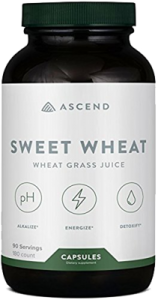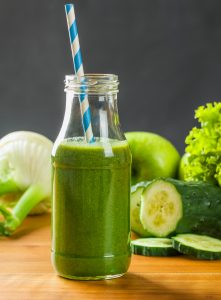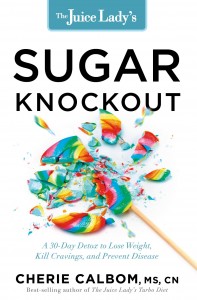Foggy Brain and the Gut-Brain Axis
Foggy Brain and the Gut-Brain Axis
Do you have a hard time focusing, or forget simple details, or mix up your words, or feel scattered or confused, don’t blame it on your brain— blame it on your gut.
Brain fog is considered as a loss of mental clarity, difficulty concentrating, and forgetfulness. Though you may feel this way before your first morning coffee, brain fog is actually a symptom of a deeper issue—inflammation in your body— and in particular, your digestive tract. Fogginess and slower cognitive function is more closely related to digestive conditions such as leaky gut, candida, and bacterial dysbiosis. This connection exists between your gut and nervous system, called the gut-brain axis.
Read MoreSelenium Deficient? Take the Quiz

Selenium Deficient?
Many people suffer from a selenium deficiency and have no idea they are deficient in this important mineral that also acts as an antioxidant. Take the quiz below to see if you have any of the symptoms of selenium deficiency.
Selenium Deficiency Quiz
- Do you have brain fog? Poor memory?
- Do you suffer from fatigue?
- Is your immune system weak? Do you often get colds and/or flu?
- Have you experienced infertility?
- Do you have slow wound healing?
- Do you shed a lot of hair?
- Have you experienced discoloration of your skin and nails?
- Are you hypothyroid?
- Have your asthma symptoms gotten worse?
- Are your nails brittle?
If you answered yes to even one of these questions, you might have a selenium deficiency.
Why People Have a Selenium Deficiency
A new study finds that climate change is lowering the amount of selenium in agricultural soils, a potential health risk factor as selenium deficiency has been linked to cardiovascular disease and certain types of cancers. (2/21/17 https://www.cantechletter.com/2017/02/soils-losing-selenium-heres-care/) Insufficient selenium intake has been estimated to affect up to 1 billion people worldwide. Dietary selenium availability is controlled by soil-plant interactions.
Also, people with digestive problems can suffer from absorption issues that can result in a selenium deficiency.
Problems Associated with Selenium Deficiency
Spacey? Foggy? Cloudy Mind?
Your forgetfulness may not be due to aging but to a deficiency of selenium. Nerve cells need selenium to produce glutathione, one of the brain’s most important antioxidants. Animals fed a low selenium diet make less glutathione. Also, blood levels of selenium drop as you age—by 7 percent after age sixty and 24 percent after age seventy-five, according to one study. (http://tipsdiscover.com/health/selenium-is-the-brain-boosting-mineral/)
• Thyroid Problems
Selenium is needed for converting the T4 thyroid hormone (thyroxine) into the active hormone T3 (triiodothyronine). When these hormones are off, the risk for developing hypothyroidism, a condition associated with lethargy, depression, and weight gain, increases. While iodine is also necessary for proper thyroid health, a deficiency in selenium also contributes to poor thyroid function.
• Weak Immune System
Selenium supports the immune system and contributes to your body’s natural defenses against the cold, flu, and other immune-compromised conditions. The immune system requires cells to communicate with each other when dealing with germs and bacteria. Selenium, as an antioxidant, supports cell communication.
• Infertility
Selenium affects sperm quality and motility. In fact, the combination of selenium and vitamin E seem to work synergistically to promote male fertility.
• Poor Wound Healing
Got a cut or bruise that just doesn’t heal like it should? It might be that you’re not getting enough selenium. Selenium helps cell tissue repair. When wounds don’t heal, or they heal very slowly, examine your selenium status as research suggests that selenium may help wounds heal faster.
• Other symptoms associated with selenium deficiency include muscle weakness, heart problems, muscle wasting and reoccurring illnesses such as the flu. Chronic selenium deficiency has been linked to mental retardation, heart disease, cancer, asthma, and rheumatoid arthritis.
Best Sources of Selenium
We need around 400 mcg of selenium per day. Include some of the following foods in your diet to make sure you are getting adequate selenium. Brazil nuts are the best food source of selenium; eat no more than 2-3 per day. (1 brazil nut can have 95.9 mcg selenium)
Additional unprocessed food sources of selenium are:
- Free range turkey and chicken
- Grass-fed beef
- Pasteurized eggs
- Oats, barley, and brown rice
- Sunflower and sesame seeds
- Broccoli, spinach, and asparagus
- Tuna, oysters, salmon, clams, halibut, and shrimp
- Wheatgrass
 Wheatgrass is a source of potassium, dietary fiber, vitamin A, vitamin C, vitamin E (alpha-tocopherol), vitamin K, thiamin, riboflavin, niacin, vitamin B6, pantothenic acid, iron, zinc, copper, manganese, and selenium.
Wheatgrass is a source of potassium, dietary fiber, vitamin A, vitamin C, vitamin E (alpha-tocopherol), vitamin K, thiamin, riboflavin, niacin, vitamin B6, pantothenic acid, iron, zinc, copper, manganese, and selenium.
It’s on sale now for 10% off with code WHEAT10.
Recipe for Today
Spinach Power
- 1 cucumber
- 1 handful spinach
- 2 celery ribs
- 1 carrot
- 1/2 lemon, peeled
Juice all ingredients and enjoy!
Read MoreImprove Depression and Mental Clarity with Watercress
Improve Depression and Mental Clarity with Watercress
Watercress was once considered by the Greeks and Romans to be a symbol of strong, influential people. And since the time of Hippocrates, it has been used as a remedy for various ailments. In the 1700s, Nicholas Culpeper (author of Culpeper’s Herbal) believed watercress could cleanse the blood. But somewhere along the way, it fell from grace. Not that long ago watercress was used as just a garnish on a plate and on occasion served in tea sandwiches. But not anymore. It’s making a comeback. It’s a superfood superstar. Research on its health benefits abound.
Read MoreNew Study Finds Sugar Can Cause Brain Damage
Does Sugar Cause Brain Damage?
“Bad news for people with a sweet tooth,” says the Telegraph (UK April 26, 2016). A new study at the University of California in Los Angeles found that fructose spiked water fed to rats for six weeks caused cognitive problems. They did only half as well in a maze alongside rats fed plain water. They drank the equivalent of the sugar in about one liter of soft drinks.
Read MoreBrain Fog and Poor Sleep; They Can Be Related
Brain Fog and Poor Sleep; They Can Be Related
Do you find yourself forgetting things or feeling just plain fogged in? Has your brain been short-circuiting? Having trouble sleeping? We joke about our forgetfulness at times…our sunglasses on our heads as we search for them…. but the seriousness of the issue is our mental performance and long term brain health. If forgetfulness and brain fog persists, it can signal the beginning of dementia or Alzheimer’s. We can’t let that go. Poor sleep is often involved with development of dementia and Alzheimer’s as well. We can do something about it.
Could You Have Brown Slime in the Brain?
Damaged cells become free radicals, and a chain reaction is set in motion. Free-radicals attack proteins in the brain. This turns them into a “sludge” called lipofuscin—a form of brown slime that can coat neurons. Ronald M. Lawrence M.D., Ph.D., a specialist in neurology and assistant clinical professor at UCLA School of Medicine says, “that slime decreases the ability of the brain to send vital electrochemical messages to other parts of the brain. As the slime thickens, memory declines and senility and dementia begin.”1 Free-radical damage to the hypothalamus and pituitary glands result in a decline in growth hormone (GH). Low GH can contribute to more of the manifestations of aging including problems with sleep. Poor sleep further contributes to mental decline. Free-radical attack on the adrenal glands results in a decline in the hormone DHEA—a hormone essential to the ability to learn and form memories.
Due to a host of modern-industrial pollutants, processed foods, too many sweets, computers and other sources of low-electromagnetic-field toxicity, and other generators of free radicals, many middle-aged and even younger people are suffering declines in memory, ability to learn, cognition, intelligence, and capacity to think clearly, along with sleep challenges. Peak mental performance is a necessity for many people. A good night’s sleep is crucial for not just brain health but overall health. You want to stop any mental decline and get your brain back in top shape.
Your first step? Scavenge free radicals and prevent attacks on brain cells with an abundance of antioxidant nutrients such as you find in fresh vegetable juice and wheatgrass juice. As you feed your body high quality “brain food” every day, you’ll see a difference. You have to also remove substances that contribute to free radical attack leading to brain decline. Sugar and artificial sweeteners are among the top contributors. Artificial sweeteners are neurotoxins that are worse for the brain that even sugar. Bottom Line: Sugar can directly contribute to brain fog. It can also really mess up your sleep. Use only natural low-glycemic sweeteners such as stevia and coconut nectar.
 Learn how to kick the sugar habit in my brand new book The Juice Lady’s Sugar Knockout!!
Learn how to kick the sugar habit in my brand new book The Juice Lady’s Sugar Knockout!!
Notes:
1 http://www.kats-korner.com/health/mdreport.html accessed 9/1/15
Read MoreWheatgrass and Brain Fog
Wheatgrass and Brain Fog
Most people have experienced brain fog from time to time, but some people have it all the time. It’s like a mental cloud. Common brain fog symptoms include poor memory, difficulty focusing, and forgetfulness. Toxicity in the brain and lack of nutrients are major contributing factors. Also, overworking, multitasking, or substance abuse (i.e. alcohol or sugar) can contribute to this foggy feeling.
Veggie juices and eating more vegetable can help immensely along with detoxing your body from time to time. Include lots of green vegetables like kale, collards, spinach, chard, turnip greens, bok choy, and broccoli for your brain. Green vegetables are among the best sources of B vitamins. Three B vitamins in particular, folic acid, B6 and B12, are essential brain vitamins. (You get B12 from animal products.) An Oxford University study found that these three vitamins work synergistically to reduce brain atrophy, improve brain function, and dramatically reduce brain shrinkage in the part of the brain most affected by Alzheimer’s.1
Green veggies are also a good source of the amino acid l-tyrosine which can improve your mood and increase your ability to learn, solve problems, and remember. Tyrosine is needed to form the neurotransmitters dopamine and norepinephrine which are associated with alertness, drive, and motivation. 2
Wheatgrass juice is rich in many brain food nutrients and is considered to be a complete food in itself. The fact is that one pound of fresh wheatgrass is equivalent in nutritional value to many pounds of choice garden vegetables. Try adding wheatgrass juice with your vegetables for good brain health.
1 http://www.pnas.org/content/110/23/9523.abstract
2 http://www.ncbi.nlm.nih.gov/pubmed/2736402
Read MoreCure Brain Fog & Poor Memory
Cure Brain Fog & Poor Memory
Do you find yourself forgetting things, misplacing stuff, or just plain feeling fogged in? We joke about our forgetfulness at times…our sunglasses on our heads as we search for them…. but the seriousness of the issue is our mental performance and long term brain health. If forgetfulness and brain fog persists, it can signal the beginning of dementia or Alzheimer’s. We can’t let that go. We can do something about it.
Could You Have Brain Sludge?
Damaged cells become free radicals, and a chain reaction is set in motion. Free-radicals attack proteins in the brain. This turns them into “sludge” called lipofuscin—a form of brown slime that can coat neurons. Ronald M. Lawrence M.D., Ph.D., a specialist in neurology and assistant clinical professor at UCLA School of Medicine says, “that slime decreases the ability of the brain to send vital electrochemical messages to other parts of the brain. As the slime thickens, memory declines and senility and dementia begin.”1 Free-radical damage to the hypothalamus and pituitary glands result in a decline in growth hormone (GH). Low GH can contribute to more of the manifestations of aging including problems with sleep. Poor sleep further contributes to mental decline. Free-radical attack on the adrenal glands results in a decline in the hormone DHEA—a hormone essential to the ability to learn and form memories.
Due to a host of modern-industrial pollutants, processed foods, too many sweets, computers and other sources of low-electromagnetic-field toxicity, and other generators of free radicals, many middle-aged and even younger people are suffering declines in memory, ability to learn, cognition, intelligence, and capacity to think clearly. Peak mental performance is a necessity for many people. Business meetings require that you be in top form. There are reports to go over, facts to memorize, summaries to write. Your job demands an alert, quick mind. So does school, if you are taking any courses. Also social settings and doing simple tasks, even if you are retired, calls for clear thinking. You want to stop any mental decline and get your brain back in top shape.
Your first step? Scavenge free radicals and prevent attacks on brain cells with an abundance of antioxidant nutrients such as you find in fresh vegetable juice and wheatgrass juice. As you feed your body high quality “brain food” every day, you’ll see a difference. You have to also remove substances that contribute to brain decline such as all sugars and artificial sweeteners. Artificial sweeteners are neurotoxins that are worse for the brain that sugar. Avoid all junk food as well, which is very bad for the brain.
Whether you want to improve memory or enhance creativity, concentration, and alertness, and prevent brain aging—dietary boosters from juicing and nutritional supplements can make a tremendous difference.
Notes:
1 http://www.kats-korner.com/health/mdreport.html accessed 9/1/15
Read More
12 Benefits of Detoxing Your Body

12 Benefits of Detoxing Your Body
- Boosts Your Energy
- Rids the Body of Any Excess Waste and Toxins
- Helps You Lose Weight
- Improved Immune System
- Healthier Skin
- Say Goodbye Bad Breath
- Promotes Healthy Lifestyle Changes
- Clearer Thinking
- Healthier Hair
- Lighter Feeling
- Anti-Aging Benefits
- Improved Sense of Wellbeing
Just how toxic are you? Take the Toxicity Quiz.
I’m offering two ways to cleanse your body with me. Join the 30-Day Detox Challenge that Begins August 10.
Come to our Juice and Raw Foods Cleanse Retreat Sept 20-25. We will go through the cleanse together with vegetable juices, wheatgrass juice, and raw foods. Part of the week will be a 3-day juice fast. You will also have a chance to cleanse emotions and toxic thinking. This is a whole person approach to cleansing the body, soul, and spirit. Don’t miss this wonderful experience with my husband and I this fall.
Read MoreSugar Hijacks Your Brain
Sugar Hijacks Your Brain
Sugar is sneaky—and unbeknown to many of us, we’ve become hooked before we know it. In ways that drugs such as nicotine, cocaine and heroin hijack the brain’s reward pathway and make users dependent, sugar is addictive in the same way.
Sugar Detox
“It almost feels like you’re detoxing from drugs,” some people say. There are four major components of addiction: binging, withdrawal, craving, and cross-sensitization. All of these components have been observed in animal models of addiction—sugar as well as drugs.
A typical experiment goes like this: rats are deprived of food for 12 hours each day, then given 12 hours of access to a sugary solution and regular chow. After a month of following this daily pattern, rats display behaviors similar to those on drugs of abuse.
They’ll binge on the sugar solution in a short period of time, much more than their regular food. They also show signs of anxiety and depression during the food deprivation period. Many sugar-treated rats who are later exposed to drugs, such as cocaine and opiates, demonstrate dependent behaviors toward the drugs compared to rats who did not consume sugar beforehand.
Like drugs, sugar spikes dopamine release. Over the long term, regular sugar consumption actually changes the gene expression and availability of dopamine receptors in both the midbrain and frontal cortex.
This means that repeated access to sugar over time leads to prolonged dopamine signaling, greater excitation of the brain’s reward pathways and a need for even more sugar to activate all of the midbrain dopamine receptors like before. The brain becomes tolerant to sugar—and more is needed to attain the same “sugar high.”
Sugar Withdrawal
In a 2002 study by Carlo Colantuoni and colleagues of Princeton University, rats who had undergone a typical sugar dependence protocol then underwent “sugar withdrawal.” This was facilitated by either food deprivation or treatment with naloxone, a drug used for treating opiate addiction which binds to receptors in the brain’s reward system.
Both withdrawal methods led to physical problems, including teeth chattering, paw tremors, and head shaking. Naloxone treatment also appeared to make the rats more anxious, as they spent less time on an elevated apparatus that lacked walls on either side. Similar withdrawal experiments by others also report behavior similar to depression in tasks such as the forced swim test. Rats in sugar withdrawal are more likely to show passive behaviors (like floating) than active behaviors (like trying to escape) when placed in water, suggesting feelings of helplessness.
A new study published by Victor Mangabeira and colleagues in Physiology & Behavior reports that sugar withdrawal is also linked to impulsive behavior. Initially, rats were trained to receive water by pushing a lever. After training, the animals returned to their home cages and had access to a sugar solution and water, or just water alone. After 30 days, when rats were again given the opportunity to press a lever for water, those who had become dependent on sugar pressed the lever significantly more times than control animals, suggesting impulsive behavior.
I encourage you to swear off sugar for good. There are also countless articles and books about the boundless energy and new-found happiness in those who have sworn off sugar for good. There are great healthful sweeteners to choose from such as stevia and coconut sugar. So why not say good bye to sugar for good and see how good you can feel? I did years ago and it was one of my life changers.
Adapted from http://qz.com/353138/this-is-what-happens-to-your-brain-when-you-stop-eating-sugar/
Read More








